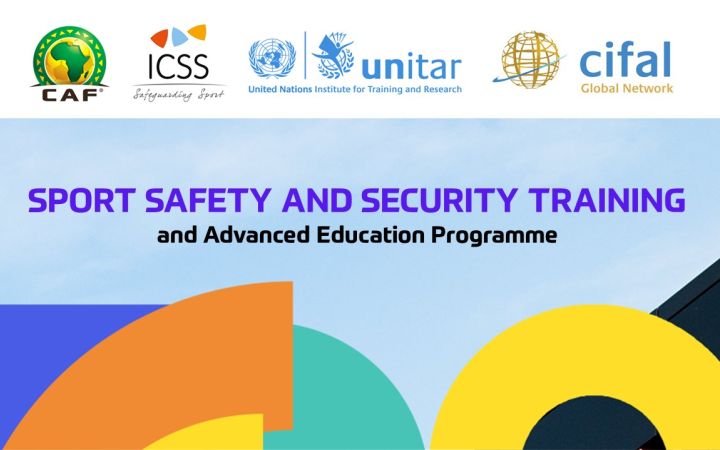15 September 2021 - The Confederation of African Football (CAF), the International Centre for Sport Security (ICSS) and UNITAR’s International Training Centres for Authorities and Leaders (CIFAL Global Network) jointly announced the launch of the first UNITAR-certified Sport Safety and Security Training and Advanced Education Programme for professionals in Africa.
The launch took place in the presence of over 200 safety and security professionals from African football federations, leagues, and clubs, as well as high-level representatives from the United Nations and FIFA.
The training programme, which was designed to develop and strengthen the knowledge, skills, and abilities of safety and security professionals in African football, was initiated within the framework of the partnership agreements between the ICSS, CAF and UNITAR respectively, with the aim of advancing sport safety, security, integrity, and socio-economic development.
Participants who enroll in the programme will take courses that focus on sport safety and security best practices structured into a series of key interlinked courses which participants can complete as a whole or independently. Successful completion of all courses will provide participants with both a higher level of certification and internationally recognized academic credits.
The course, entitled Sport Safety and Security Fundamentals, will be the first in a series of courses offered by the three partners this fall, which will be followed by courses on Sport Safety and Security Planning, Safety and Security at Major Sporting Events, Threat and Risk Assessments, COVID-19: Safety and Security Planning for the New Normal, Physical Protective Security Measures, Technical Protective Security Measures, Operational Protective Security Measures, Incident Response and Crisis Management, Safety and Security Command and Control, Crowd Management, Calculating Venue Safety Capacity and Safety and Security in the Context of the Sustainable Development Goals (SDGs).
The programme is certified by UNITAR and delivered by its CIFAL Global Network to meet an exceptionally high training and learning standard and guarantees that participants will increase their knowledge and develop new skills.
In its initial stage, the training course will primarily target safety and security professionals from national football federations, national and local football leagues, as well as football clubs on the African continent. Individuals located on the African continent interested in transitioning into the sports safety and security industry may also partake in this training programme.
Each course will be delivered in a virtual classroom environment using a blended learning approach. This will include asynchronous and synchronous instructional approaches.
Commenting on the roll-out of the programme, the ICSS CEO, Massimiliano Montanari, said:
Safety and security practitioners serve as the guardians of football competitions and thanks to their work, which is often behind the scenes, the players, spectators and the overall football community is protected. It is time to fully recognize and internationally certify their role and give it the importance it deserves.
The Confederation of African Football is happy today to present to Africa a sustainable training programme that will afford all interested persons the opportunity to learn more about sport safety and security. Our goal has always been to make our stadiums safe for all football stakeholder groups and to achieve this we need to have trained personnel responsible for the safety and security arrangements in our stadiums. Today we are witnessing one of the benefits of our collaboration with the ICSS and UNITAR’s CIFAL Global Network, and we are glad to be part of this history,
said Dr. Christian Emeruwa, who heads the CAF Safety and Security Department.
Julio Andrade, Director of CIFAL Málaga, highlighted the importance of this agreement by emphasizing that after home and school, sport is the third area of development for minors.
In this area people develop physically, socially and psychologically. For this reason, the world of sport, particularly football, has a great responsibility in terms of contributing to the promotion of the SDGs and leading the way in ensuring that sport is played in safe and sustainable environments,
said Andrade.
Sports, especially for our youth, has proven to be an important enabler for promoting peace and the UN Sustainable Development Goals through tolerance, respect and empowerment of communities in need. UNITAR and the CIFAL Global Network are proud to be partners in the timely launch of the ‘Sport, Safety and Security Training and Advanced Education Programme’, which aims to ensure responsible governance in the football scene – and beyond,
concluded Alex Mejia, Director, Division for People and Social Inclusion; Head, CIFAL Global Network.
If you would like to know more about the first UNITAR-certified Sport Safety and Security Training and Advanced Education Programme for professionals in Africa, please visit the dedicated ICSS webpage here.
Background Information
About the International Centre for Sport Security (ICSS)
The International Centre for Sport Security (ICSS) is an independent and non-profit organization established in 2010 with the aim of safeguarding sport in terms of safety, security, and integrity, and to protect the opportunities sport can generate in the socio-economic context.
For more information, please visit: www.theicss.org
About the Confederation of African Football (CAF)
The Confederation of African Football or CAF is the administrative and controlling body for African association football. CAF represents the national football associations of Africa, runs continental, national, and club competitions, and controls the prize money, regulations and media rights to those competitions.
For more information, please visit: www.cafonline.com
About CIFAL Global Network
The CIFAL Global Network is part of the United Nations Institute for Training and Research (UNITAR). The Network comprises 22 International Training Centres (CIFALs) and aims to serve as a platform for capacity-building of government authorities and civil society leaders on topics related to sustainable development, as well as on global mandates and goals of the United Nations. Since its inception in 2003, the Network has trained more than 60,000 beneficiaries through over 600 training and knowledge-sharing events (as of December 2015). It reached more than 10,000 beneficiaries from 75 countries in 2015.
For more information please visit: https://unitar.org/about/offices-training-centres-around-world/cifal-global-network
About the United Nations Institute for Training and Research (UNITAR)
The United Nations Institute for Training and Research (UNITAR) provides innovative learning solutions to individuals, organizations and institutions to enhance global decision-making and support country-level action for shaping a better future.
Over the years, UNITAR has acquired unique expertise and experience in designing and delivering a variety of training activities. UNITAR has become a leading institute in the provision of customized and creative learning solutions to institutions and individuals from both public and private sectors.
For more information, please visit: https://unitar.org/



